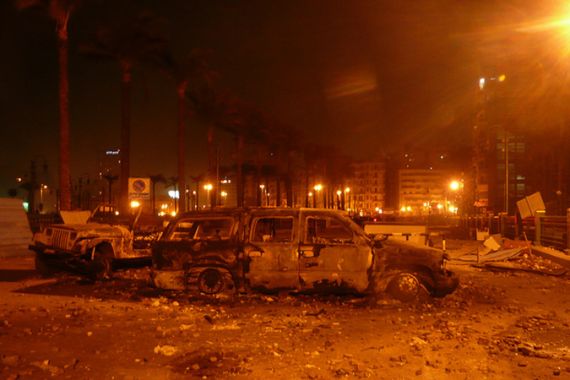Walking Cairo’s uncertain streets
Thousands of protesters remained angry with Mubarak government on Saturday , but it was unclear if anyone was listening.

This post was written by an Al Jazeera English online producer who is in Cairo.
Following a violent Friday in Cairo, during which more than 100 protesters likely died, the streets of the city seemed calm when I made my way through Tahrir Square on Saturday evening.
Earlier in the day, on my drive in from the airport, the increased army presence on the streets was immediately noticeable. Armoured personnel carriers sat atop bridges on the main road into the city.
But as the taxi wound through the main arteries in central Cairo on the way to our bureau, it seemed like neither the army nor the police were in charge. Average citizens in t-shirts and suit-jackets directed traffic through the garbage-strewn roundabouts of the capital. Groups of young men milled in the streets.
In Tahrir, the normally jammed heart of Cairo, tanks parked themselves near the famous Egyptian Museum and blocked certain thoroughfares. Protesters and curious citizens like climbed over them, taking pictures with army soldiers who shooed them away when angry commanders approached.
Throughout the day, the city seemed tense – smoke rose from several fires throughout town – but it seemed that Cairenes weren’t in the mood for decisive action.
This was partly due to widespread looting reported throughout even some of Cairo’s wealthier neighborhoods, like Maadi and Heliopolis. Three men I passed on the street on my way to Tahrir Square at night told me that I wasn’t safe, that thugs – beltagaya in Arabic – were out. Some of them had been purposefully released from prison, they told me.
The men were in a hurry; they said they needed to get back to their homes to protect them from the thugs.
Nearer to the square, I met Ahmed Abdelaziz, whose job at a shipping company had been placed on indefinite hold by the unrest.
The picture Abdelaziz painted was confusion – plainclothes police reportedly blending in with protest crowds, fires spreading elsewhere in the city, protests beginning and ending in a flash.
Just 24 hours earlier, president Hosni Mubarak, in power for three decades, had announced the sacking of his government. On Saturday, he appointed intelligence chief Omar Suleiman as vice president – a position that hasn’t existed in Egypt for years – and civil aviation minister Ahmed Shafiq as prime minister.
I asked the men who had gathered around myself and Abdelaziz what they thought. Suleiman, many said, had a good reputation among Egyptians. When I mentioned Mohamed ElBaradei, the former UN nuclear watchdog chief, they seemed slightly incredulous. Few in Egypt, it seems, think ElBaradei is the kind of leader they need right now.
In the square, protesters staged sit ins, prayed, held up posters calling for Mubarak’s ouster, sang songs and chanted angrily. Prominent religious and television personalities held court. Giant ponds of sitting water covered streets that would normally be jammed with weekend traffic.
Near the Mogamma, the hulking headquarters of Egypt’s bureaucracy, burned out cars, shotgun shells and broken rocks still covered the street. The sour smell of burning buildings and hovering tear gas remained in the air, stinging the eyes and causing us to sneeze.
“We will not go home until Hosni Mubarak leaves,” Abdelaziz, who spent a year in the army himself, told me.
At an army checkpoint, a man with his daughter on his shoulders chatted to soldiers. Another yelled angrily, in a hoarse voice, that the people should be let through to take control of the nearby interior ministry, which he said rightfully belongs to them.
Back toward the center of the square, women clad in black niqabs stepped daintily on a ladder that had been laid across one of the giant puddles. Men clapped to protest chants on a loudspeaker. A larger group was now sitting down on the grass. Later, I would watch them light small campfires from my hotel balcony, which looked out over the deserted streets, the burnt-out shell of the former ruling party headquarters, and the still smoldering remains of the national women’s council.
As we get ready for Sunday night, with military jets screaming back and forth over the crowd in Tahrir, it seems as though Saturday may have been a lull, a regrouping period for an Egyptian population that’s not ready to accept the concessions offered.
As Abdelaziz told me when he left to get his dinner: “We meet here, then back to the revolution”.